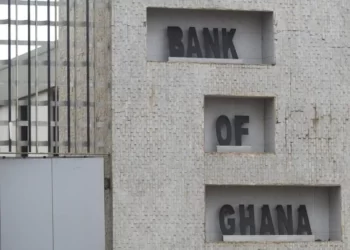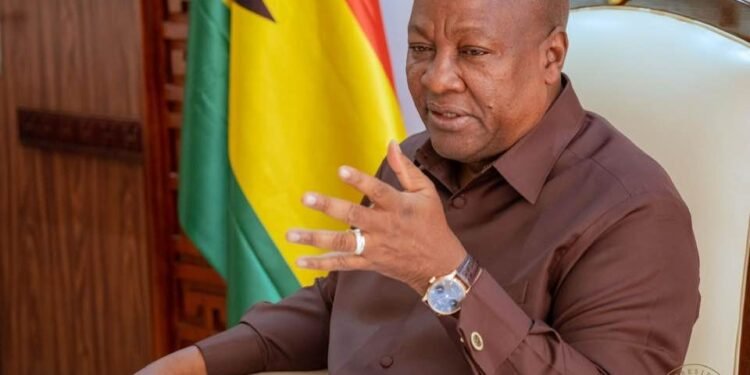Ghana’s gold reserves have reached their highest level in history, with the Bank of Ghana (BoG) confirming that total holdings rose to 38.04 tonnes at the end of October 2025, representing a 35% increase from the 28.1 tonnes recorded during the same period last year.
According to newly released market data from the Central Bank, Ghana’s official gold reserves stood at 30.53 tonnes in December 2024, indicating that about 7.51 tonnes have been added between January and October 2025.
This marks a significant milestone in the country’s ambitious strategy to strengthen its foreign reserves and stabilize the cedi through enhanced gold accumulation.
The BoG’s October update also revealed that the central bank’s foreign reserves now cover approximately four and a half months of imports, signaling a strong recovery from the near depletion experienced during Ghana’s 2022 economic crisis.
The accumulation of gold, paired with foreign currency inflows, has bolstered confidence in the country’s external position and the resilience of its monetary framework.

Bank of Ghana Governor Dr. Johnson Asiama credited this progress to Ghana’s revamped gold trading and reserve management system, particularly the establishment of the GoldBod, a state-run gold trading entity launched in March 2025.
“The GoldBod has brought in about $8 billion by centralizing the purchase and export of gold,” Dr. Asiama said during a recent engagement at the IMF and World Bank Annual Meetings in Washington, D.C.
“It’s like a revolving kind of fund that we operate.
“And I think so far, it’s been complementary, helping us to build our reserves.”
Bank of Ghana Governor Dr. Johnson Asiama
The new trading framework ensures that a greater portion of foreign exchange earned from Ghana’s gold exports is retained domestically, reducing what the Governor described as “foreign-exchange leaks.”
Under the system, mining firms sell a portion of their output to the Bank of Ghana and other authorized state agencies, which then manage exports and currency inflows more effectively.
Sustained Growth in Gold Holdings

The data shows a steady upward trend in Ghana’s gold holdings since the beginning of the year.
In September 2025, total gold reserves were recorded at 37.06 tonnes, reflecting a 21.3% increase from the start of the year. The additional one tonne acquired in October pushed the figure past the symbolic 38-tonne mark.
This growth reflects the continued success of the Domestic Gold Purchase Programme (DGPP), launched in 2021 to diversify the country’s foreign assets and reduce exposure to volatile global currencies.
Under this initiative, the central bank purchases gold locally from licensed mining companies and small-scale miners, converting it into reserve assets to enhance balance sheet strength and currency stability.
According to analysts, the BoG’s increased accumulation of gold represents a “strategic hedge” against global uncertainty, inflation, and currency depreciation pressures.
Gold, which maintains intrinsic value during economic downturns, provides the central bank with a reliable cushion against market volatility and external shocks.
Economic Implications and Market Confidence

The Bank of Ghana’s gold accumulation policy is a “turning point” in the country’s quest for monetary sovereignty.
The consistent increase in reserves, has helped stabilize the cedi, lowered the risk premium on Ghana’s external debt, and improved investor confidence in the country’s financial management.
The success of the gold accumulation programme is also expected to have spillover effects on Ghana’s broader economy.
By purchasing gold locally, the BoG provides a stable market for artisanal and small-scale miners, creating jobs and ensuring that more of the sector’s value remains within the country.
With the BoG’s gold reserves now surpassing 38 tonnes, policymakers believe the next phase will focus on sustainability and optimization. Plans are reportedly underway to expand refining capacity and increase storage infrastructure to accommodate growing reserves.
As global demand for gold strengthens amid geopolitical uncertainty, Ghana’s proactive accumulation strategy positions it advantageously within international markets.
If the current pace of accumulation continues, Ghana’s reserves could exceed 45 tonnes by mid-2026, further reinforcing its standing as one of Africa’s top gold reserve holders.
The Bank of Ghana’s successful gold strategy marks a major policy win—one that blends innovation with prudence, linking the nation’s abundant mineral wealth directly to economic resilience and monetary stability.
READ ALSO: Ghana Revenue Authority Unveils Aggressive Plan to Add GH¢10 Billion to Domestic Revenue























